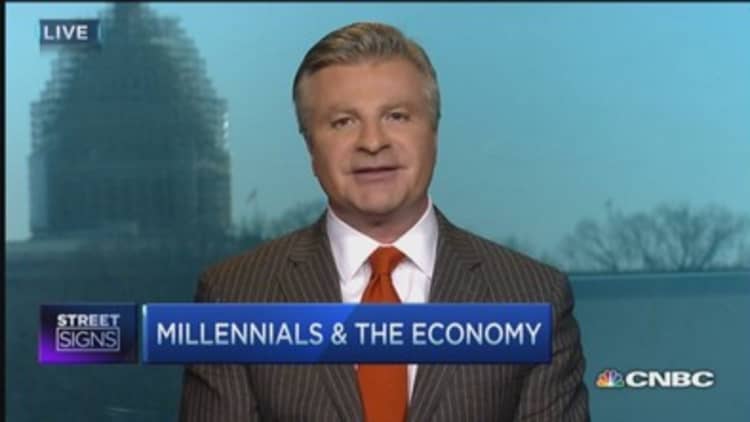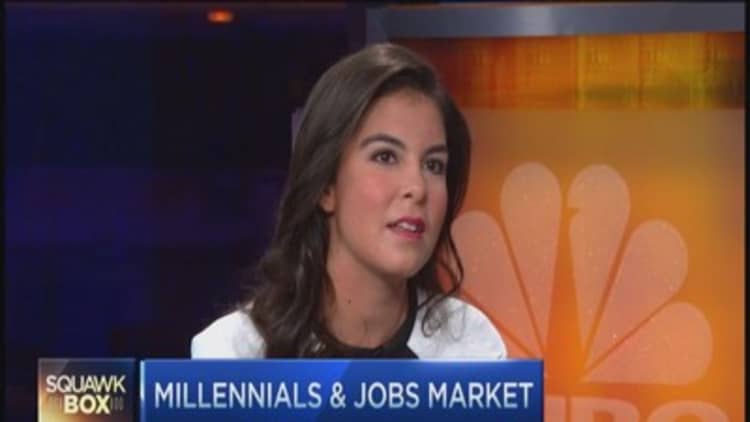



Even though the stock market is booming and the economy continues to grow, the 2008 financial crisis is having a lingering effect on many young adults' willingness to take risks.
The problem, say financial advisors, is that it's causing an entire generation to potentially miss out on huge gains in their retirement portfolios.
"A lot of them took risks. They stretched to go to grad school with loans, found themselves without a job or took on debt to buy homes with nonconventional mortgages, with the promise that their homes would appreciate, but they didn't," said Barry Glassman, a certified financial planner and president of Glassman Wealth Services. "The message they got is that risk doesn't always work."
A Bankrate.com report released in July showed that Americans age 18 to 29 are more likely to choose cash as their favorite long-term investment over any other age group. In fact, 39 percent said cash was their preferred way to invest money not needed for 10 years or longer.
The report pointed out, however, that the had gained 17 percent over the previous year, while cash investments generally were garnering returns below 1 percent.
In another study, released earlier this year by Northwestern Mutual Life Insurance, only 11 percent of those age 18 to 29 said they are comfortable with the risks associated with growth strategies in their portfolios. Just 14 percent said they are pursuing as much growth as possible.
"The danger in being too conservative is, foremost, your portfolio won't even keep pace with inflation," said Ben Tobias, a certified financial planner and president of Tobias Financial Advisors. "That's a problem."
Tobias said his firm has worked with clients' adult children who are actually more conservative than their parents.
But consider this: Tobias pointed out that if you were to invest $100 in certificates of deposit—which are insured by the Federal Deposit Insurance Corp.—you might double that in 20 years.
"But the fact that it doubles is less important than how much that $200 will buy in 20 years," Tobias said. "You don't lose [your original investment], but you're guaranteed the effects of inflation and taxes, and you'll end up with less purchasing power than your original investment. That's the most important thing."
Advisors say millennials' aversion to risk is reminiscent of so-called "Depression babies": people who grew up watching their parents and other adults lose their life savings, their jobs and general financial security.

Young adults, likewise, have lived through the tech bubble bursting in 2001, the 9/11 terrorist attacks and the 2008 financial crisis.
"They are less trusting of big financial institutions and the stock market in general," said certified financial planner Greg Sarian, managing director and partner at HighTower Advisors. "I didn't see this [phenomenon] 15 years ago."
What Sarian and other advisors do is educate young clients—or adult children of older clients—about exactly what risk is in a portfolio, and help them figure out exactly how much risk makes sense for them personally.
"They just won't make money in bonds and cash," Sarian said. "That only protects your money.
Read MoreTake charge of retirement now
"If you're in your 70s, protection is critical," he added. "But if you are young, you need to take some risk in your [asset] allocation."
However, most young adults are not benefiting from sitting down with a professional who can ease their mind about the stock market. According to a report from The Northwestern Mutual Life Insurance Co., only 13 percent of adults age 18 to 29 work with a financial advisor.
So for those going it alone?
"I'd encourage them to look at any 20-year period of the stock market and its performance over that time," Tobias of Tobias Financial Advisors said.
For example, take the 20-year period from 1993 to 2013, which included two of the worst periods in stock market history. Yet the average yearly return for the S&P 500—generally considered a broad gauge of the stock market's performance—during that 20 years was 9.13 percent. Even when adjusted for inflation, that figure is 6.6 percent.
Tobias points out that many of the horror stories young adults have heard of people losing their shirt in the stock market come from those who failed to stay invested when the market crashed.
"The number of people who liquidated their portfolios in 2008 is tremendous," he said, adding, "They are the ones who are hurting. The ones who stayed invested don't have those horrible stories."
Inherently, if you feel a sense of stability, you can open your mind to taking more risk.Avani Ramnanidirector, financial planning & investment management, Francis Financial
Certified financial planner Avani Ramnani pointed out that if young adults face uncertainty in their lives due to unemployment or underemployment or any other life situation that makes them feel insecure, they are less likely to take financial risks in their portfolios.
"Inherently, if you feel a sense of stability, you can open your mind to taking more risk," said Ramnani, director of financial planning and investment management for Francis Financial.
"The danger is the long term," she said. "If they stick to that conservative approach to investing over their whole life, they are [hurting] themselves."
—By Sarah O'Brien, special to CNBC.com




